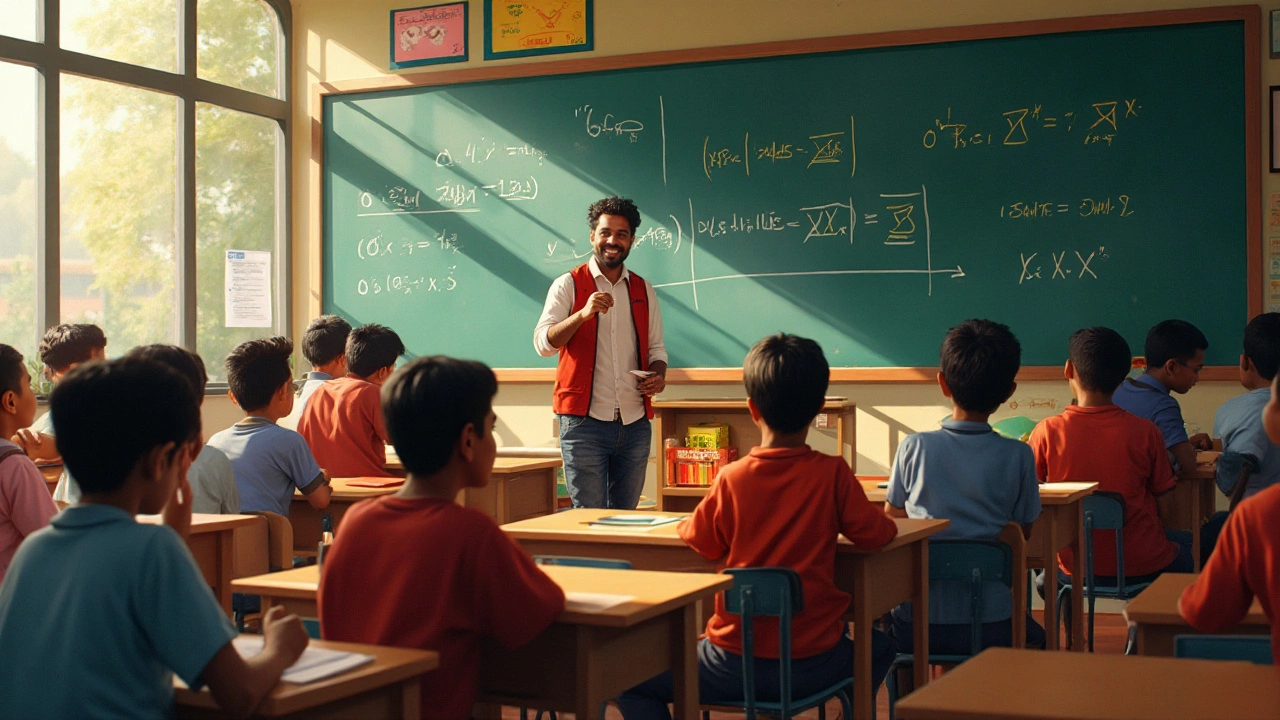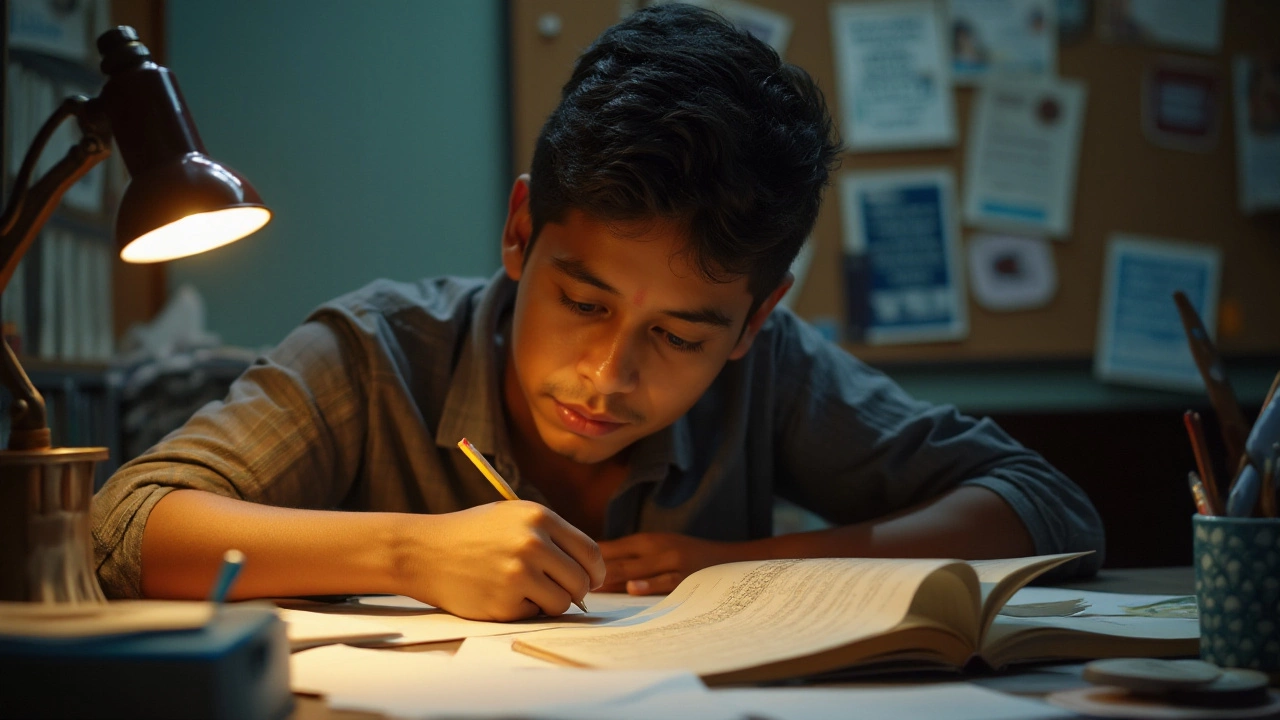
Decoding the Toughest Subject in CBSE Curriculum
In the vibrant world of CBSE syllabus, each subject presents its own set of challenges and wonders. Yet, for many students, some subjects stand out as particularly strenuous, leaving a trail of head-scratching and late-night study sessions. Among these, Physics often emerges as a topic of debate, noted for its rigorous mix of theoretical concepts and practical applications.
While individual experiences may vary, understanding the common hurdles students face can be a first step toward conquering them. This narrative not only explores the reasons behind these perceptions but also shares invaluable tips and tricks from seasoned educators and industrious students. Whether you're tackling tough equations or unraveling complex theories, there's a strategy waiting to be discovered that can transform difficulty into triumph.
- The Nature of Difficulty in CBSE Subjects
- Physics: A Common Challenge
- Student Perspectives
- Expert Insights on Learning Difficult Subjects
- Tips to Tackle Tough Topics
The Nature of Difficulty in CBSE Subjects
Understanding why certain subjects in the CBSE syllabus are perceived as difficult requires a deep dive into both the structure of the curriculum and the cognitive demands it places on students. Firstly, the sheer volume of content that students are expected to master is significant. The curriculum is designed to comprehensively cover each subject area, providing students with a robust foundation necessary for both higher education and competitive examinations. However, for many, this extensive breadth of material to be retained and understood can be overwhelming. Subjects like Science and Mathematics, often cited as challenging, demand not only rote memorization but also the application of concepts to solve complex problems.
Another layer of difficulty arises from the abstract nature of the content. Take Physics, for instance, a subject that frequently tops the list of academic challenges. With its blend of theoretical constructs and practical problem-solving, students must not only grasp intricate theories but also develop an intuition for applying these concepts in various contexts. This abstract thinking can be particularly challenging for students who excel in concrete or more tactile areas of study. According to a report by the National Council of Educational Research and Training (NCERT), about 40% of students find conceptual understanding in science subjects particularly taxing.
The burden of an ambitious curriculum can sometimes cloud the joy of learning, a sentiment echoed by educators and students alike. Dr. S. Kumar, a renowned educationist, says, "Balancing depth and breadth in education is crucial, but often neglected, leading to considerable student stress."
The way subjects are taught also plays a role in perceived difficulty. Traditional teaching methods, while effective for some, may not cater to the diverse learning styles present in modern classrooms. Visual learners might struggle in text-heavy environments, while auditory learners may find lectures more conducive to their learning. The lack of personalization in teaching can lead to gaps in understanding, making certain subjects seem insurmountable. Furthermore, when external pressures from parents and societal expectations about performance are added into the mix, students might find themselves grappling with feelings of inadequacy and stress, compounding the difficulty they face in their academic pursuits.
The assessment methods used in CBSE also contribute to this perception. Students are often evaluated through examinations that emphasize the end result rather than the learning process. This can create a high-pressure environment where the focus shifts to grades rather than the mastery of the subject matter itself. The competitive nature of these exams can exacerbate anxiety, which in turn affects performance. An interesting data point here is the statistic from the CBSE annual report, which indicates that nearly 30% of students feel consistently anxious about their ability to keep up with academic demands. Such stress can obscure the learning process, turning subjects that should be intriguing and engaging into sources of dread.
Physics: A Common Challenge
Physics, as part of the CBSE syllabus, is often celebrated for its ability to explain the natural world with eloquence and precision. Yet, this very complexity can make it an intimidating subject for students striving to excel academically. Delving into the laws of motion, energy transformations, and magnetic forces demands not only an understanding of abstract concepts but also the ability to apply them in practical scenarios. The interlocking nature of theory and application in physics is precisely what leads many students to dub it the hardest subject.
One reason physics stands out as a difficult subject is its reliance on mathematics. A strong foundation in mathematical skills is imperative as students journey through topics like calculus-based kinematics and electromagnetism. For many students, these concepts introduce variables and equations that are less intuitive and require abstract thinking. As students grapple with vectors or partial derivatives, it’s not uncommon to find ample room for missteps, especially without proper guidance or practise.
Another layer of challenge comes from the subject's experimental component. Physics isn’t only about theoretical calculations; laboratory experiments play an essential role in deepening understanding. Experiments often require precision and patience, attributes that test a student's ability to handle detailed procedures while considering potential sources of error. These hands-on experiences, despite their challenge, provide invaluable insights that can demystify daunting concepts, creating a holistic approach to understanding academic challenges.
To understand the common struggle with physics, it's important to listen to voices within the academic community. According to the CBSE, many students perceive physics as difficult because it requires a different kind of learning approach. "Physics isn't just about rote memorization," asserts Dr. Anjali Gupta, a renowned educator. "It's about understanding concepts and applying them logically. Patience and perseverance are crucial qualities here."
Perhaps unexpectedly, societal narratives can also amplify the difficulty perceived in studying physics. Often, it's portrayed as a subject suitable only for 'geniuses' or the exceptionally bright, which can be daunting for students. This perception tends to discourage those struggling, when what is needed is encouragement and an understanding of individual learning curves. One should consider how physics' reputation could potentially demoralize students, which underscores the need for nurturing their curiosity rather than burdening them with unrealistic expectations.
Lastly, an engaging look at some data may offer perspective. According to a survey of 1,000 CBSE students, 45% found physics to be the subject they feared most due to the level of problem-solving required. Yet, interestingly, 50% of those who initially struggled reported that their perspective improved after seeking additional support from tutors or using digital learning resources. These insights indicate that with proper strategies, the perception of physics as the hardest subject can be mitigated, transforming the narrative from struggle to success.

Student Perspectives
Diving into the labyrinth of the CBSE syllabus, many students cite Physics as the looming mountain they must conquer. This perspective is shaped by myriad factors, from dense textbooks brimming with complex theories to numerical problems that demand a deep understanding and patience. For some, the challenge lies not just in rote learning but in the ability to apply principles to real-world scenarios, a skill not easily mastered overnight. Students often find themselves grappling with formulae that seem abstract and unyielding without the right guidance.
One common narrative among students is the pressure of high-stakes exams where Physics can make or break their academic performance. Here, endless hours of revision often culminate in a make-or-break examination that can dictate their future path. Such pressure can lead to a mental block, leaving many feeling overwhelmed. To provide context, a survey from CBSE students reported that over 50% found Physics to be the hardest subject, primarily due to its requirement for a systematic approach to problem-solving and critical thinking.
C.B.S.E. topper Arunav Tripathi once remarked, "Physics was a subject where I felt the weight of every mark, but it taught me the value of perseverance and methodical practice."
Many learners express the need for interactive learning, where visual aids and practical labs could demystify the abstract concepts that fill their textbooks. The traditional classroom lacking in real-time applications often leaves students yearning for more engaging teaching methods. While some passionately tackle the syllabus, others adopt a survival mentality, aiming to pass rather than excel, highlighting a gap in engaging curriculum design.
Interestingly, a noticeable shift occurs when students collaborate with peers, forming study groups that foster a collective drive. These discussions often lead to a shared sense of camaraderie, where students learn to view struggles as opportunities for growth. In these settings, students exchange tips and tricks, simplifying complex theories and supporting each other through periods of doubt and uncertainty. It is in these informal classrooms that many find the clarity and confidence to navigate through difficult topics.
Interactive Learning and Peer Support
Faced with rigorous demands, students naturally gravitate towards environments that inspire curiosity and support. One effective approach they often use is forming study groups where peers come together, creating a shared pool of knowledge and a support network. These setups not only alleviate the pressure of individual study but also facilitate an exchange of ideas, allowing students to see varied perspectives.
Moreover, integrating technology into learning, such as educational videos and simulation apps, provides a dynamic alternative to static textbooks. Students frequently report that these tools help visualize complex phenomena, turning the abstract into something tangible and easier to understand. In fact, a significant percentage of students noted improvement in their grasp of difficult concepts when using interactive tools alongside traditional methods.
Ultimately, while individual experiences with the hardest subjects like Physics may vary, students consistently emphasize the importance of having diverse learning methods and supportive educational communities. Through collaboration and innovation, what once seemed an indomitable challenge slowly transforms into a mountain slightly easier to scale, armed with strategic knowledge and shared perseverance.
Expert Insights on Learning Difficult Subjects
When confronted with the daunting breadth of the CBSE syllabus, it’s not uncommon for both students and educators to grapple with the intricate challenges posed by subjects deemed difficult. One of the foremost academic experts, Dr. Rajesh Sharma, the former head of the Physics department at the Indian Institute of Science, often highlights that the primary hurdle in subjects like Physics is the dual demand of understanding complex theories and applying them practically. It's not just about memorizing facts but digesting and utilizing them in new contexts, which makes it uniquely challenging compared to other academic pursuits. This process is known to develop critical thinking skills which are not immediately apparent but gradually become crucial in advanced educational stages.
Additionally, students' perceptions of hard subjects are significantly shaped by their learning environments and teaching methodologies. A qualitative study conducted by the National Council of Educational Research and Training (NCERT) in 2023 revealed that over 60% of students considered the mode of teaching to greatly influence their experiences with difficult subjects. Teachers who employed interactive and practical learning strategies reported a noticeable improvement in student engagement and academic performance. Hence, educational experts advocate for strategies that include more practical and laboratory-based learning environments, particularly in schools adhering to the CBSE curriculum.
Effective Strategies from Educators
Renowned educators propose that breaking down complex topics into smaller, manageable sections can dramatically enhance comprehension and retention. According to Professor Anjali Menon from Delhi University, this technique works in tandem with active learning methods, such as peer teaching and problem-based discussions, which serve to anchor knowledge by relating it to real-world scenarios. To further maximize student learning, a flipped classroom model — where students initially explore new material at home and then work through exercises in class — has been promoted. This approach encourages students to take ownership of their learning while providing opportunities for immediate feedback and clarification in a classroom setting.
"The key to tackling hardest subjects is cultivating curiosity and a proactive approach toward learning," suggests Dr. Anita Desai, a veteran education consultant, in her insightful book on modern teaching methods. She emphasizes that when students are motivated to explore the topics themselves, they tend to overcome the initial anxiety of complexity.
Key Data and Technological Insight
Modern technology has also forged powerful tools for engaging students with challenging content. A survey by TechEd Research highlights that 75% of CBSE students using educational apps report an improvement in their understanding and grades within subjects they previously struggled with. These apps provide interactive simulations and real-time problem-solving, thus catering to varied learning styles and paces. Academic challenges are further mitigated by virtual reality exercises, which allow students to visualize and manipulate elements in a way that traditional methods cannot. As access to technology continues to grow, its role in simplifying complex subjects becomes increasingly indispensable.
- Understand the core concepts through practical application.
- Utilize teaching methods like active learning and flipped classrooms.
- Incorporate technology, such as educational apps, to aid in comprehension.
- Encourage a sense of curiosity to reduce intimidation factors.
- Seek feedback and clarification in interactive settings.
By drawing on these expert strategies and insights, students will find themselves better equipped to confront and excel in the most difficult arenas of the CBSE syllabus, transforming daunting challenges into rewarding achievements.

Tips to Tackle Tough Topics
Confronting the hardest subject in the CBSE syllabus can feel like scaling a daunting peak. Yet, with the right strategies, most students can find themselves mastering subjects like Physics or Mathematics with confidence. One of the key strategies is developing a consistent study schedule. Designating specific times each week to tackle these subjects can significantly aid in building a routine, reducing procrastination, and minimizing the stress often associated with last-minute cramming.
Committing to active learning methods also plays a crucial role in understanding challenging content. Instead of passively reading textbooks, students should engage with the material actively—be it through solving problems, participating in group discussions, or teaching concepts to their peers. This approach not only helps in internalizing information but also improves retention and understanding. A respected educator once said,
"If you can't explain it simply, you don't understand it well enough." This statement underscores the importance of deep comprehension over superficial knowledge.
Integrating technology into the study routine is another effective strategy. Numerous apps and online resources provide interactive ways to understand complex theories, offering simulations and visual aids that textbooks might lack. For example, educational platforms often offer virtual labs or 3D visualizations that can bring abstract concepts to life, aiding in a better grasp of the subject matter. It's important to leverage these resources while also adhering to a healthy digital consumption pattern to prevent burnout.
Enhancing your learning techniques further with mnemonic devices and analogies can also be invaluable. These help in breaking down complex subjects into manageable pieces, making recall easier during assessments. Formulas and long theories often become easier to remember if they are connected with silly sentences or vivid imagery. For instance, students who once struggled with remembering scientific classifications found that linking names with personal anecdotes or funny stories significantly improved their recall abilities.
Networking with fellow students and seeking guidance from teachers can never be underestimated. Forming study groups not only provides different perspectives on the same topic but also creates an environment of mutual learning and support. Teachers, on the other hand, can offer personalized feedback and elaborate on doubts, ensuring no stone is left unturned in understanding a challenging topic. Sometimes, an enlightening conversation with a peer or educator sheds light on a previously confusing concept in a way textbooks never could.
Tracking your progress regularly can also provide a much-needed morale boost. Keeping a journal or spreadsheet of topics covered, alongside difficulties faced, can help in recognizing patterns and areas needing more focus. Incremental achievements should be celebrated, as they signify growth and depth in knowledge. After all, mastering a tough subject isn’t just about knowing all the answers; it’s also about understanding and wrestling with what you don’t know yet. The journey of learning is as significant as the destination.






Write a comment